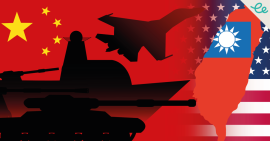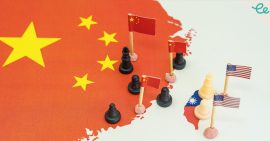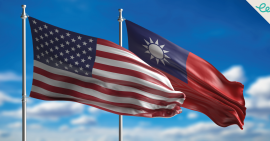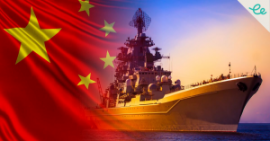Taiwan defies China to choose “destroyer of peace”, the DPP’s William Lai
War or peace? Beijing tried to frame Taiwan’s presidential and legislative elections on January 13 as an existential choice between the “destroyer of peace”, Vice President Lai Ching-te of the ruling DPP, and the more China-friendly opposition parties. Voters in the self-ruled island mostly ignored Beijing’s bluster – and chose the status quo.
They also broke records, as the DPP became Taiwan’s first party to win a third consecutive term in power. And the DPP’s Huang Jie became Taiwan’s first openly gay legislator. Enodo Economics were on the ground in Taipei to witness another triumph for democracy. We observed efficient, transparent voting and counting, speedy results, and cordial concession speeches. In this blogpost, we explore the implications for Cross-Strait and US-China relations.
Who won what?
Lai and running mate Hsiao Bi-khim won the presidential election for the DPP. However, they secured the lowest winning percentage since 2000 (40.05%). The main opposition Kuomintang (KMT) garnered 33.49%, and the upstart Taiwan People’s Party (TPP) exceeded expectations by winning 26.46%.
In the Legislative Yuan, the DPP lost its parliamentary majority, slipping to 51 seats. Meanwhile, the KMT rose to 52 seats and can count on the votes of two independents. With neither party achieving the 57 seats required for a majority, the TPP emerged as kingmaker by winning eight seats. On February 1, the KMT’s Han Kuo-yu, who lost the 2020 presidential election to the DPP, won the election for the speakership, receiving 54 votes to the DPP candidate’s 51. The TPP’s eight legislators voted for their own candidate in the first round, then abstained in the second. The DPP’s domestic agenda will now prove harder to push through parliament, but how much harder remains uncertain. While Han expressed hope all three parties can work together on important social and economic issues, the likelihood is legislative gridlock on proposals related to national defence, foreign policy and cross-strait relations.
Voters told Enodo Economics that they split their votes. They aimed to keep the DPP in the presidential office to maintain the status quo with China. But they sought to deprive the party of legislative control to express discontent with domestic issues like flat wages, high property prices, and environmental concerns.
What next for cross-Strait relations?
“We want the status quo. We want the way it is – neither unification, neither independence,” said Alexander Tah-Ray Yui, Taiwan’s top diplomat in Washington. His next boss, president-elect Lai, and VP-elect Hsiao face a tough four years ahead as China is likely to continue to refuse to engage with the DPP, after eight years of blanking President Tsai Ing-wen.
Lai has pledged continuity with Tsai’s policies. The US will pressure him to maintain Tsai’s careful diplomacy and avoid rhetoric that could spark Chinese over-reaction. Lai’s speech at his May 20 inauguration will be closely watched.
China’s Taiwan Affairs Office played down what it called a “regional” election, telling state news agency Xinhua that “Taiwan is China’s Taiwan”, and the election “will not impede the inevitable trend of China’s reunification.” While the public reaction has been muted, without punitive economic actions, Beijing has resumed military pressure around the island and stepped up “grey zone” intimidatory tactics, including the increased sending of high-altitude balloons into Taiwan’s airspace.
Taiwan’s defence ministry described the balloons as “cognitive warfare”intended to demoralize Taiwan’s 23 million people. While some may be primarily meteorological in use, the balloons represent further intimidation against Taiwan. They test and wear down its threat awareness. And also prepare the path for further escalation, such as overflight by drones and then fighter jets. Miscalculation could cause collisions – and conflict.
We expect China to adopt a wait-and-see approach to the incoming administration. We believe the election does not increase the likelihood of conflict. If the TPP aligns with the KMT, Beijing may feel that the outcome offers positive space to work towards a KMT victory in 2028. KMT officials expressed frustration to Enodo Economics. They noted that China has not learned that the heavier its interference, the more it repels the Taiwanese people.
The mixed results mean “every victor has something to worry about, and every loser can take solace in something,” noted Nottingham University’s Jonathan Sullivan. Beijing spent eight years intensifying pressure and telling China that Taiwan’s people hate the DPP secessionists for splitting the Chinese nation, yet the DPP won again, he wrote. The PRC can frame the results as Lai lacking a popular mandate, but “a dramatic escalation does not serve the PRC’s goals at a time of domestic uncertainty.”
Impact on US-China relations
Beijing said the US was “gravely wrong” to congratulate Lai on his victory, as China considers all Taiwan matters “internal affairs” that foreigners shouldn’t touch. US Secretary of State Antony Blinken had said he looked forward “to working with Dr Lai and Taiwan’s leaders of all parties to advance our shared interests and values.”
Blinken also stressed that the US is “committed to maintaining cross-strait peace and stability”, which includes pressure on the DPP to maintain the status quo. Washington doesn’t need another international crisis, especially one that could dwarf the others. War over Taiwan could cost the global economy around $10trn, equal to about 10% of global GDP, estimated Bloomberg.
In late January, Chinese Foreign Minister Wang Yi reminded US National Security Adviser Jake Sullivan that Beijing believes “Taiwan independence” poses the biggest risk to Sino-US ties. Their nations are playing nice for now, with growing bilateral engagement. However, their rivalry remains so fundamental and potentially devastating. 50 prominent Australians recently called on the US and China to agree a comprehensive new détente to resolve differences peacefully.
Would Trump abandon Taiwan?
We expect China will be relatively circumspect in the run-up to the US elections in November. Domestic difficulties mean Beijing is eager to ease tensions and sees little merit in maintaining an antagonistic posture.
But a Donald Trump victory could change the geopolitical picture. This is because of his lack of commitment to Taiwan, unlike Joe Biden. In resurfaced comments from July, Trump declined to give a firm answer when asked if the US would protect Taiwan from Chinese aggression. He also repeated claims that Taiwan stole the US chip business.
The US could abandon Taiwan under a second Trump presidency, said the spokesperson of Beijing’s Taiwan Affairs Office. “The United States will always pursue ‘America First’, and Taiwan will change from a ‘chess piece’ to an ‘abandoned piece’ at any time,” said Chen Binhua on January 31.
Trump is in campaign mode, so expect more contradictions and headlines in the months ahead. These may not translate into policy if he is re-elected. On February 4, Trump praised his “very good friend” Xi Jinping, then raised the prospect of higher tariffs on Chinese imports. For now, it appears that a second Trump administration would be less chaotic than the first. His campaign has greater organization, structure and a clearer set of domestic policies. We do not expect Trump to take a substantively different stance on China to the Biden administration.
Related Articles:
Will China Use Israel-Hamas War To Attack Taiwan?
Laying the Groundwork for Better US-China Relations
Taiwan presidential election set to shape US China relations








